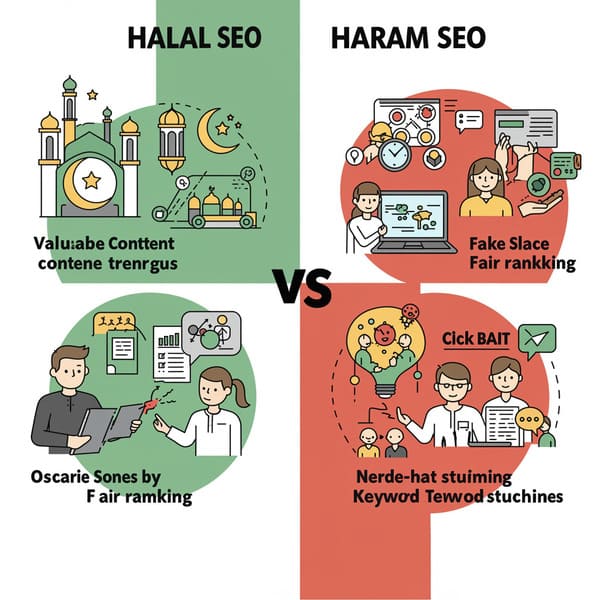24/7 Services Available
Is SEO Halal or Haram? Understanding SEO in Islamic Manner
Is SEO Halal or Haram? Understanding Islamic Perspectives on SEO
Seo is mainly halal . If seo is done using ethical and honest methods it is considered as halal . But it becomes haram if you do cheating and use Black hat techniques
In today’s digital world, many Muslims ask an important question: Is SEO halal or haram? As online businesses grow, people want to know if doing Search Engine Optimization (SEO) is allowed in Islam. They also want to make sure their work follows Islamic values.
Some say SEO is a good way to earn money online. Others worry it may involve cheating or lying. So, what’s the truth?
This guide will help you understand the Islamic view on SEO. We’ll explore what SEO is, what Islam says about honest business, and whether SEO fits within those teachings. Our goal is to explain it in simple words, so even beginners can learn and decide the right path.

Let’s look at SEO with clear eyes and clean hearts.
What is SEO? (Search Engine Optimization)
SEO means improving a website so it shows up on top in Google or other search engines. It helps people find the right websites when they search for something online.
For example, if someone types “best halal food near me,” SEO helps your halal food business appear on the first page. This means more people can find your shop, blog, or service.
How SEO works:
- You use the right keywords that people search for.
- You write helpful content that answers their questions.
- You make your website fast and easy to use.
- You get links from trusted websites.
SEO is like telling Google, “Hey, my website is helpful!” It’s not magic. It’s smart work.
When done honestly, SEO helps people find good and useful content. That’s why many Muslims see SEO as a fair and helpful tool—if used the right way.
Islamic Principles in Business and Marketing
In Islam, business is not just about making money. It is also about doing the right thing. Every Muslim must follow Islamic ethics in work and trade. This includes being honest, fair, and kind to others.
Honesty is a key rule. You must tell the truth about your product or service. Don’t make false claims. If you’re selling something online, your marketing should not trick or confuse people.
Transparency is also important. This means you should clearly share prices, services, and what people can expect. Don’t hide extra fees or use fake reviews.
Fairness matters too. You should treat customers, workers, and partners with respect. No cheating or using unfair ways to get ahead.
Marketing in Islam must help people, not mislead them. You can promote your work, but the message must be clean, clear, and honest.
When done right, digital marketing—including SEO—can follow these halal business practices. The key is your intention and your methods.
SEO Halal Hai Ya Haram? (Is SEO Halal or Haram?)
Now let’s answer the main question: Is SEO halal or haram in Islam?
Basically Seo halal ha agr us mn koi cheating ya black hat technique na ho .
The answer is: It depends on how you do it.
✅ Why SEO Can Be Halal
Many scholars agree that SEO is halal if used in the right way. That means:
- You use honest and clear content.
- You don’t lie or cheat Google.
- You help users find real and useful information.
- You avoid tricks that mislead people.
In this way, SEO becomes a form of halal digital marketing. It helps both the business and the customer.
❌ When SEO Becomes Haram
SEO can turn haram if you:
- Use black-hat SEO (like spammy links or hidden text).
- Trick users into clicking fake titles or fake promises.
- Write content only for Google, not for real people.
- Spread lies or promote harmful things.
Islam teaches us not to cheat—whether in a shop or on a website. If SEO becomes a tool for deception, it’s no longer halal.

So the real question is not “Is SEO allowed in Islam?” but “How are you doing SEO?”
When your goal is to help, inform, and serve others through honest means—SEO is halal.
Ethical SEO Practices That Align with Islamic Values
To make sure your SEO is halal, you need to follow white-hat SEO techniques—the ethical side of search engine optimization.
Start with quality content. Write helpful, honest, and clear content for your audience. Don’t just write for Google; write for people. This supports the Islamic value of truthfulness.
Use ethical link-building. Reach out to trusted websites and build real partnerships. Don’t pay for spammy backlinks. This follows the rule of fairness.
Avoid tricks like clickbait titles. If your headline promises one thing, your content must deliver it. No lies, no fake promises.
Also, be clear in your ads. If it’s a sponsored post or ad, say so. Islam values transparency. Your audience deserves to know the truth.
Other ethical SEO methods include:
- Proper keyword use without stuffing
- Clean, fast websites that help users
- Respecting copyright and not copying others’ work
All these techniques reflect halal SEO practices. They show honesty, fairness, and care—qualities Islam encourages in every business.
By following these transparent SEO methods, your digital marketing can be both effective and halal.
Unethical SEO Practices That Could Be Haram
Some SEO methods may look smart, but they are haram in Islam because they involve cheating or manipulation.
One example is keyword stuffing—repeating keywords unnaturally to rank higher. This confuses readers and goes against honesty.
Cloaking is another. It shows one thing to users and something else to search engines. This is a form of deception.
Buying backlinks from link farms is also a problem. It’s like paying for fake trust. In Islam, trust must be earned—not faked.
Other black-hat SEO methods include:
- Hiding text to trick Google
- Copy-pasting others’ content
- Using bots to generate traffic
All these break the Islamic rules of truth, fairness, and clean business. They may work for a short time, but they hurt others and your long-term success.
In Islam, the way you reach success matters. And unethical SEO techniques are not the right way.
How to Ensure Your SEO Practices Are Halal?
Want to keep your SEO halal and clean? Here are some easy steps:
- Focus on people first. Make your website useful. Give honest answers and clear info.
- Use white-hat SEO only. Avoid shortcuts or tricks that cheat the system.
- Stay transparent in your ads, titles, and content.
- Review your SEO often. Are you doing anything shady, even by accident? Fix it.
- Learn from Islamic SEO guidelines and follow scholars’ advice when in doubt.
Halal SEO is not just about avoiding the bad. It’s about choosing the good—helping others, growing fair businesses, and following the path of honesty.
Conclusion: SEO – Halal or Haram?
So, is SEO halal or haram? The answer depends on how you do it.
If your methods are honest, clean, and helpful—SEO is halal. But if you lie, trick, or cheat—it becomes haram.
Islam gives us clear rules: be honest, be fair, and never harm others for personal gain.
As Muslims in digital business, we must follow these rules online, just like offline. Let’s use ethical SEO to grow, serve, and succeed—in this world and the next.
Need Halal SEO for Your Business?
I’m a Freelance SEO Consultant who offers ethical SEO services that follow both Google’s best practices and Islamic principles.
Whether you’re running a local business or a global eCommerce store, I can help you:
- Grow with white-hat SEO
- Rank your website without tricks
- Build long-term traffic and trust
📩 Let’s talk today about building your halal online presence.
📱 Message me or email for a free consultation.
Do SEO the right way—grow your business, and your blessings.
